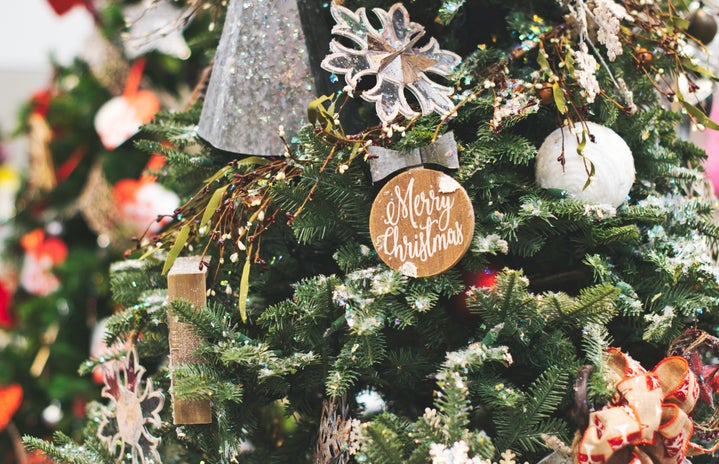If you leave your house between Nov. 1 and Dec. 24, you will inevitably be sucked into 21st century commercialism on a grand scale. The holiday season is the largest moneymaker for corporations in the United States and in 2021 was responsible for retail sales totaling 889 billion USD. Therefore it can be objectively said that people love Christmas, and extrapolating that information brings to the table the notion that Christmas makes people happier. I certainly feel that way. For me, Halloween is the holiday I have to endure before the best season of the year begins. It is worth discussing the commercialisation and the effects of it on your average citizen. Not for the over-hyping of the holidays (how could you ever have such a thing) or the corporate greed of CEOs (admittedly, a driving factor), but the positive effects it has on the mental health of people who give into an early commercialized Christmas season.
At 8:30 a.m. on Thursday Nov. 2nd, I was at Starbucks for the beginning of my Christmas season. For many, this is just a little too early to begin celebrating. Many view the corporate takeover of the holidays and the quick turnaround from Halloween to Christmas irritating. Of course, I understand that Americans can’t forget Thanksgiving, but in my mind the holiday season is all encompassing, and Thanksgiving is an appendage of that season. Why else would Santa conclude the Macy’s Day Parade? But I get it, there’s a lot of commercialisation around the holidays to increase corporate profit margins and hype up whatever Bath & Body Works candle now comes in ‘Vanilla Bean Noel’ (no hate to Bath & Body Works — I love the Christmas candles). Personally, that’s part of the fun. What’s the harm in starting Christmas early? I may be feeding into corporate greed and buying the marked-up items that simply state ‘Merry Christmas,’ but honestly as the saying goes, ‘if it ain’t broke, don’t fix it.’ Christmas may have started too early for some, but for others — and speaking for myself — it never does. With the turmoil and stress of the nightly news and rising mental health crises, we could all do with a bit of Christmas spirit, even if it comes in the form of Starbucks on Nov. 2nd.
My social media has been a driving force behind the early holiday season, as the Instagram and TikTok algorithms create more content for me to view. Furthermore, the ability of social media to infiltrate our homes has only increased the commercialisation of the holidays. Usage of social media gives brands better access to a younger audience which researchers know is a key marketing ploy to sell more products, and it idealizes certain products that fit with certain aesthetics. However, this doesn’t necessarily mean it is negative media. While social media can be addictive it is important to note that as with in-person Christmas shopping and engagement, social media can cause the same positive emotions to occur. For instance, there’s a certain Christmas TikTok floating around that claims people who decorate for Christmas earlier are happier. Luckily for everyone this theory has already been proven by a psychologist working with Today. Deborah Serani stated the chromotherapy of the lights and decorations spike the brain’s dopamine levels and create a “neurological shift that can produce happiness.” Makes sense to me; I don’t know about you but decorating for Christmas is one of the best traditions in my life. When the tree is put up, the fire has been lit, and the Christmas lights illuminate the room, it makes life that much better. I find that social media is a great way to figure out new baking recipes, find holiday decor and themes, and create Christmas lists. The reels or TikToks that show specific holiday aesthetics are my favorite and my friends and I send each other multiple a day. Even that connection to the holidays through social media helps me to have a more positive outlook and be excited for the Christmas season.
The same can also be said for the arrival of in-person displays of holiday merchandise. The sooner stores jump on this trend of switching holidays right after Halloween, and people begin getting emails with Christmas campaigns, the sooner people will be immersed in the holidays. This in turn can produce a spike in dopamine and thus make people happier. I myself have fully embraced this to get me through the final weeks of classes this semester. Just this past week I got an email from Skims announcing their holiday cozy collection that made me want to buy all the red and white checkered pyjamas, and made me feel more connected to the Christmas season. I know that I can’t speak for everyone, but the commercialisation of Christmas could only be a positive for me. Despite the fact that it forgets the true meaning of the holiday and markets plastic that degrades the environment only to enrich big corporations and CEOS, it adds to the magic of Christmas. Imagine if there were no holiday displays, no holiday social media trends, and no Starbucks Christmas cups — the whole season would just feel a bit less happy. Therefore, while many will look at the present holiday season with annoyance for the commercialised early start, I would say to them to find joy in it, because we have very little to lose and so much to gain from it.


